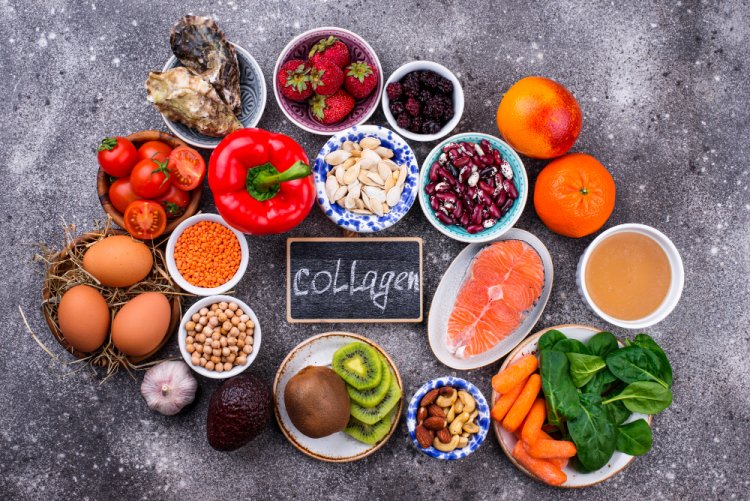The Remarkable Role of Collagen: Enhancing Skin, Bone, and Heart Health
Collagen stands as a foundational protein in the human body, playing a pivotal role in the structural integrity and functionality of various tissues and organs. Its significance extends to diverse aspects of health, including skin vitality, bone strength, and cardiovascular function. Understanding the profound effects of collagen on these critical areas underscores its importance in maintaining overall well-being.

Collagen and Skin Health
The skin, being the body's largest organ, relies heavily on collagen for its structural support and resilience. Collagen fibers provide the skin with strength, elasticity, and hydration, contributing to its youthful appearance and texture. However, as we age, collagen production naturally diminishes, leading to visible signs of aging such as wrinkles, fine lines, and sagging skin.
Incorporating collagen-rich foods into one's diet can help counteract these effects by promoting collagen synthesis within the skin. Collagen supplements, particularly those containing collagen peptides, have been shown to stimulate the production of new collagen fibers, resulting in improved skin elasticity, firmness, and hydration. Additionally, collagen supplementation may help reduce the appearance of age-related skin issues such as cellulite and stretch marks, restoring a more youthful and radiant complexion.
Collagen and Bone Health
The integrity of our skeletal system relies heavily on collagen, which provides the structural framework necessary for bone strength and density. Collagen fibers serve as a scaffold upon which minerals like calcium and phosphorus are deposited, contributing to bone mineralization and overall bone health.
With advancing age, however, collagen synthesis declines, leading to decreased bone density and increased susceptibility to fractures and osteoporosis. Incorporating collagen-rich foods or supplements into the diet can help support bone health by stimulating collagen production and promoting bone mineralization. Studies have shown that regular consumption of collagen can improve bone density, reduce the risk of fractures, and support overall skeletal integrity, particularly in postmenopausal women and older adults.
Collagen and Heart Health
Beyond its benefits for the skin and bones, collagen also plays a crucial role in maintaining cardiovascular health. The amino acids present in collagen, notably proline and glycine, exert protective effects on the heart and blood vessels. Proline helps prevent the accumulation of arterial plaque, reducing the risk of atherosclerosis and cardiovascular disease. Meanwhile, glycine supports healthy blood vessel function and may help lower blood pressure levels, further promoting heart health.
By incorporating collagen-rich foods into the diet, individuals can support cardiovascular function, reduce the risk of heart disease, and improve overall cardiovascular well-being. Moreover, the synergistic effects of collagen on skin, bone, and heart health underscore its role as a multifaceted nutrient with profound implications for overall health and longevity.
Foods Rich in Collagen
Several foods naturally contain collagen or provide nutrients that support collagen synthesis in the body:
- Bone Broth: Made by simmering animal bones and connective tissue, bone broth is an excellent source of collagen, as well as minerals essential for bone health.
- Fish: Certain types of fish, such as salmon and mackerel, contain collagen peptides along with omega-3 fatty acids, which support skin and heart health.
- Egg Whites: Egg whites are rich in proline, an amino acid crucial for collagen production.
- Citrus Fruits and Berries: These fruits are high in vitamin C, which is essential for collagen synthesis and skin health.
- Leafy Greens: Vegetables like spinach and kale are rich in antioxidants and vitamin C, which protect collagen from damage and support its synthesis.
- Nuts and Seeds: Almonds, sunflower seeds, and pumpkin seeds are excellent sources of zinc, a mineral necessary for collagen synthesis and wound healing.
- Lean Protein: Incorporating lean protein sources such as chicken, turkey, and tofu provides the amino acids necessary for collagen production and overall tissue repair.
In conclusion, collagen stands as a remarkable protein with diverse benefits for skin, bone, and heart health. By incorporating collagen-rich foods into the diet, individuals can harness its potential to promote vitality, resilience, and longevity. Whether through collagen supplementation or dietary sources, prioritizing collagen intake can support overall well-being and enhance the quality of life throughout the aging process.
#CollagenBenefits #SkincareRoutine #HealthyLiving #SkinHealth #BoneStrength #HeartHealth #AntiAging #HealthyEating #NutritionTips #WellnessJourney #BeautyInsideOut #NaturalBeauty #YouthfulSkin #HealthyAging #VitalityBoost
Disclaimer:
The information provided in this article is for educational purposes only and should not be considered medical advice. If you have any health concerns or are experiencing symptoms, it is important to consult with a healthcare professional, such as a doctor or clinic, for proper diagnosis and treatment. Always seek the advice of your doctor or other qualified health provider with any questions you may have regarding a medical condition. Do not disregard professional medical advice or delay in seeking it because of something you have read in this article.
What's Your Reaction?





















